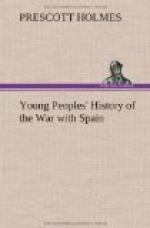The destruction of the Spanish fleet at Santiago was as complete as the destruction of the Spanish fleet at Manila. Commodore Schley was the senior officer in command, and it was fitting that the man who “bottled-up” Cervera’s fleet should be the one to destroy it. After peace was declared, he was promoted to be a rear-admiral, and the people of the United States presented him with the costliest sword ever given a military or naval officer. It was a direct gift from the people to the man, and showed the estimation in which they held him.
In the running fight at Santiago, as at the battle of Manila, every officer and man did his duty. The Spanish vessels were out-sailed and out-fought. The American vessels were not injured and the Spanish were crushed. The American gunnery was effective at close range and long; the Spanish gunnery was not good at any range. The American shells told wherever they struck and the American vessels were maneuvered with the greater skill. Under the stress of the greatest excitement, the Americans showed the effect of their splendid drill and discipline.
Admiral Cervera and the principal Spanish officers were taken to Annapolis and installed in comfortable quarters. One of them said: “You ought to be proud of your country, because you have such good people.” Another remarked, “I do not know that I am a prisoner except that I cannot go home.” Eventually they were all sent back to Spain.
It has been truly said that laughter and tears lie very close together. It is equally true that in the midst of solemn and terrible events some amusing things happen, even though they may not seem funny at the time. And so, in connection with the exciting events of July 3d, 1898, some laughable stories are told.
When the Spanish fleet came out of the harbor with all their colors flying, a lieutenant on the Texas looked up and saw that his ship was displaying nothing but the Stars and Stripes. “Where are our battle-flags?” said he. Just then the Texas sent a shell against the Maria Teresa. “I guess they won’t have any doubt about our being in battle,” said Captain Philip. But the lieutenant thought that a battle was nothing without battle-flags, and sent a messenger after them. But the flags were locked up, and the man who had the key was busy in another part of the ship. “Then smash the locker,” said the lieutenant, when informed of this fact. The locker was smashed, and soon the Texas was fighting under her battle-flags.
In the thickest of the fight a young lad on the Texas was heard to say: “Fourth of July celebration, eh? A little early, but a good one!”
During the chase after the Colon, the men of the Oregon went in turn to dinner, Captain Clark having called to them: “Now, children, go and get something to eat, if it is only a little bread and butter.” The men satisfied themselves with a few bites, and then hurried back to the deck to watch the exciting race. The Oregon and the Brooklyn were gaining steadily on the Colon. Suddenly the Brooklyn signaled to the Oregon: “She seems built in Italy.” And the Oregon signaled back: “She may have been built in Italy, but she will end on the coast of Cuba.”




